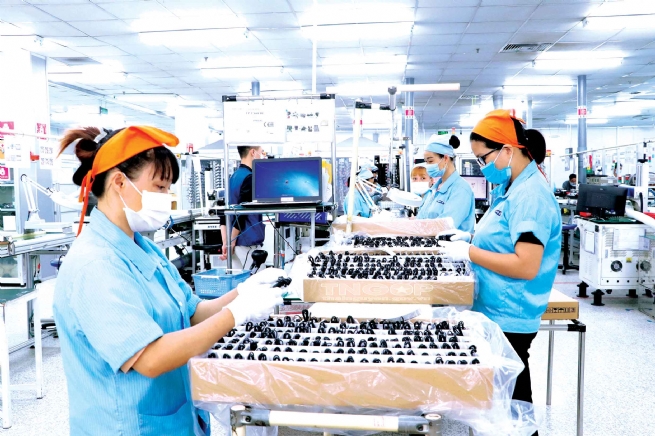Vietnam Aims for Self-Reliant, Strong Industry
Amid the dynamic restructuring of global supply chains, Vietnam has a significant opportunity to strengthen its position on the international industrial map. A wide range of policies and directives from the Party and the State are being actively carried out with the aim of developing a self-reliant, modern industrial sector that can compete globally.
Under the theme “Building a Self-Reliant and Strong Vietnamese Industry,” the High-Level Industrial Production Forum 2025 took place on September 12 to present and exchange national industrial policies and strategies; promote localization and strengthen the ability of Vietnamese enterprises to engage more deeply in global supply chains. The forum also aimed to connect the industrial business community, from small and medium-sized enterprises (SMEs) to tier-1 suppliers of FDI corporations, while offering a platform for policy-business dialogue and fostering inspiration for cooperation and innovation.
At the forum, key issues on Vietnam’s industrial production development were discussed from various perspectives. These included: vision and strategic orientation for building a self-reliant industry; strategies to foster innovation and technology transfer; solutions to enhance the competitiveness of Vietnamese industrial enterprises; measures to accelerate industrial growth and develop resilient supply chains; and ways to strengthen the participation of Vietnamese enterprises in global supply chains.
A panel discussion also took place with the participation of experts, representatives of associations, and businesses, focusing on enhancing localization capacity and technological self-reliance as solutions for Vietnamese enterprises to integrate into global value chains.
In his opening remarks, Dr. Nguyen Quan, former Minister of Science and Technology and Chairman of the Vietnam Automation Association, outlined Vietnam’s industrial development orientations and objectives, while affirming the vital role of industrial production in achieving economic growth targets.
However, Vietnam’s industrial production still lacks a sufficient number of large-scale enterprises and corporations, particularly in heavy industry and high-tech manufacturing. The supporting industry has not yet fully met practical needs; domestic enterprises remain primarily focused on service provision and have yet to become essential links in global production and supply chains. Reports indicate that over 6,000 supporting industry enterprises are currently operating, but they fulfill only around 10% of domestic demand for components and spare parts.
Therefore, selectively attracting foreign direct investment (FDI) and fostering stronger connections between FDI firms and local enterprises will be a decisive factor in enhancing Vietnam’s supporting industry capacity.
The current context presents many favorable conditions for enterprises in general and industrial producers in particular to thrive, especially as the Party and State have issued key resolutions guiding the development of science and technology, unlocking legal frameworks, and emphasizing the growth of the private sector.

Over 6,000 supporting industry enterprises are currently operating, yet they meet only about 10% of domestic demand for components and spare parts
Quan also emphasized that the business community must seize opportunities promptly to achieve stronger growth. At forums and community events like this, enterprises should actively engage in exchanges to promote cooperation and investment, with the goal of enhancing production capacity instead of remaining at the level of service provision.
Sharing this view, Hoang Quang Phong, Vice President of the Vietnam Chamber of Commerce and Industry (VCCI), highlighted the proactive role of enterprises in moving towards a strong industrial foundation.
From this forum, VCCI hoped enterprises will actively collaborate, align under common orientations, assign responsibilities, and form efficient production and supply chains. Participants should engage in deeper exchanges across the necessary dimensions to build a self-reliant and strong Vietnamese industry, enhance international competitiveness, and meet the country’s economic development requirements.
Hoang Quang Phong also suggested that in the process of exchange and cooperation, enterprises should focus on concrete goals such as trade promotion, expanding investment networks, strengthening supply chain connectivity, increasing localization rates, and supporting technology innovation.
The business community must also proactively identify “bottlenecks” and propose specific solutions to address them, thereby unlocking resources for Vietnam’s industrial production to continue growing vigorously and contributing positively to national economic development.
At the forum, representatives of several tier-1 vendors for FDI enterprises also shared experiences in accessing and gradually participating more deeply in global production and supply chains.








